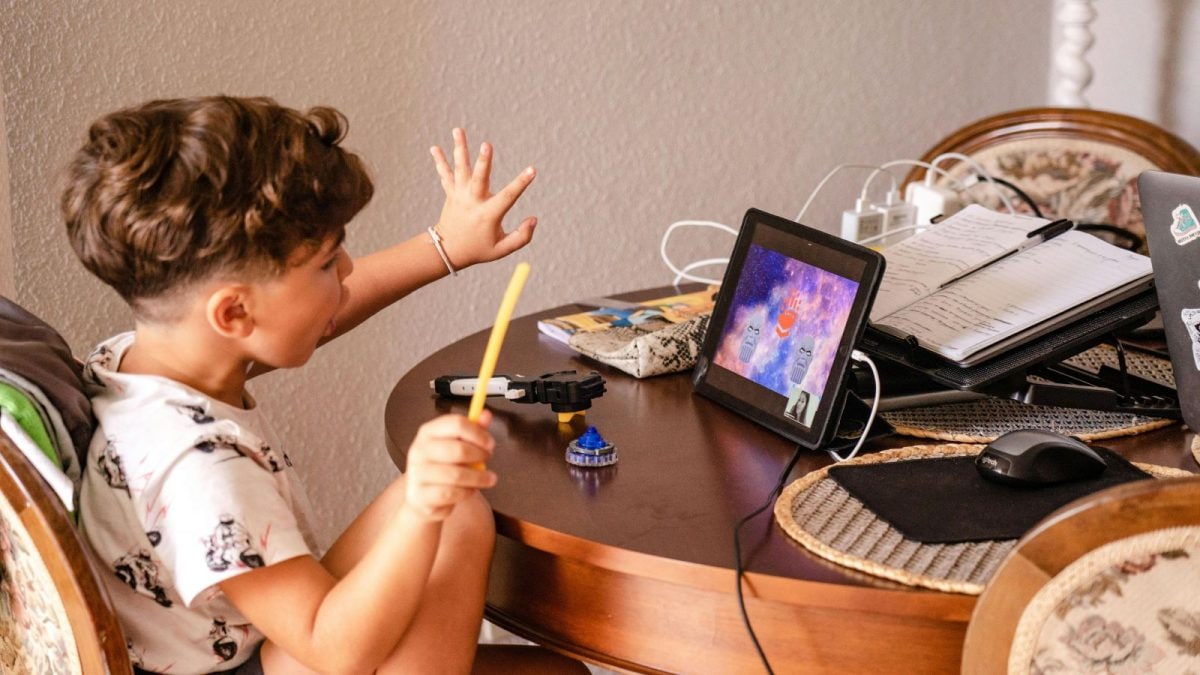Last Updated:
By eating into playtime, schools are shaping a generation of sedentary children, more prone to obesity, insulin resistance, and attention disorders than ever before.

Technology has deepened this crisis. Children no longer run outdoors for entertainment, they scroll (Image: Canva)
Every day across Indian cities, school bells ring for what should be the most joyful period on the timetable, Physical Education. But instead of the thump of running feet and shouts from the playground, classrooms stay full. Teachers rush to complete chapters, students copy notes, and the PE period, the only time children are meant to move freely disappears from the schedule.
It happens quietly, but the impact is loud and lasting. By eating into playtime, schools are shaping a generation of sedentary children, more prone to obesity, insulin resistance, and attention disorders than ever before. What seems like an extra 40 minutes of study time could actually be costing them their long-term health.
The Silent Epidemic in the Classroom
Studies over the past decade have shown a disturbing trend: Indian children are getting heavier, more sedentary, and more prone to metabolic diseases at younger ages. According to the Indian Council of Medical Research (ICMR), nearly one in ten school-aged children in urban India is overweight or obese.
Many show early signs of insulin resistance – a prelude to diabetes and doctors say the age of onset is falling rapidly. Physical inactivity is the biggest culprit.
The World Health Organization recommends at least 60 minutes of moderate to vigorous physical activity daily for children, but most Indian schools provide barely a fraction of that. Between long classes, exam pressure, and tuition after hours, movement has been reduced to a luxury.
Nutrition expert Sheetal Yadav from Bengaluru explains, “Insulin resistance and childhood obesity form a vicious cycle. Long study hours, extra classes, and app-based games are pushing kids toward inactive lifestyles. The fat cells that form in childhood stay for life, which is why it’s much harder to reverse obesity later.”
Cancelled PE, Cancelled Health
A generation ago, children ran in open fields, cycled to school, and climbed trees. Today, they spend most of their waking hours sitting at desks, in vehicles, or in front of screens.
In many private schools, Physical Education is squeezed into a single weekly session. And when exams approach or the syllabus lags, it’s the first period to be sacrificed.
The consequences are physiological as well as psychological. The less children move, the less efficiently their bodies handle glucose. The energy meant for muscles is stored as fat instead. Over time, this leads to insulin resistance – a metabolic condition that sets the stage for diabetes, high blood pressure, and heart disease.
The problem compounds when schools lack playgrounds altogether. Urban land prices and space constraints have pushed newer institutions into vertical buildings where outdoor space is minimal. For many students, their only exposure to movement is the walk between classrooms.
The Dopamine Trap: How Screens Replace Play
Technology has deepened this crisis. Children no longer run outdoors for entertainment, they scroll. Social media, gaming apps, and streaming platforms now deliver what the brain interprets as “rewards,” but without the physical engagement or community connection that outdoor play once provided.
Dr. Alok Kulkarni, Senior Consultant Psychiatrist at Manas Institute of Mental Health, Hubballi, explains: “Our culture now normalizes sitting for hours in front of screens. Adults do it constantly, so kids follow. Earlier, people interacted with their community; now children don’t even know what that feels like. Easy dopamine from screens has reduced their attention spans. They get bored of one video and immediately jump to the next.”
He adds that this constant stimulation, combined with the consumption of ultra-processed foods, “hijacks the brain’s dopamine system.” “Children develop impulsive behaviour.
What starts as casual screen time during meals, often introduced by parents becomes a habit that hardens into addiction. We now have a defined psychiatric condition called internet gaming disorder,” he warns.
Dr. Kulkarni insists that awareness must begin at home: “Adults should first reduce their own screen use, especially in front of kids. It has to start early, even before age one. We also need national-level programs to reconnect children with community spaces and schools.”
A Culture That Sits Too Much
Indian children are not missing out on play because they’re being forced to study, they’re missing out because their world has shrunk. School buses replace walking, tuition replaces outdoor games, and mobile screens replace neighbourhood cricket. Even in households that can afford sports academies, exercise is often seen as an extracurricular privilege rather than a daily necessity.
But the human body was built to move. Regular physical activity improves not only muscle and bone health but also cognitive development and emotional balance. Studies have shown that physically active children perform better academically, focus longer, and have fewer behavioural problems than their sedentary peers.
Why Schools Must Take Responsibility
Experts argue that reversing this health crisis starts within school walls. Every institution, public or private should guarantee dedicated time and infrastructure for play. PE classes should be non-negotiable, not optional.
Reforms could include:
- Making 60 minutes of daily physical activity mandatory.
- Ensuring every school has access to a safe play area.
- Introducing structured exercise modules to complement academics.
- Training teachers to integrate movement breaks during long classes.
When schools reclaim playtime, they do more than promote fitness, they safeguard attention, discipline, and mental resilience.
The Way Forward
The health of India’s children depends on one simple idea: movement must matter as much as marks. The culture of cutting PE periods for “more study” is a dangerous trade-off. One that mortgages future health for short-term academic gain.
As Dr. Kulkarni puts it, “Children today aren’t lazy, they’re simply not given opportunities to move or explore. We’ve replaced curiosity with convenience.”
The classroom might build intellect, but the playground builds everything else – strength, focus, friendship, and confidence. A nation that wants healthy adults must start by protecting its children’s right to play.
October 31, 2025, 16:15 IST
Stay Ahead, Read Faster
Scan the QR code to download the News18 app and enjoy a seamless news experience anytime, anywhere.








